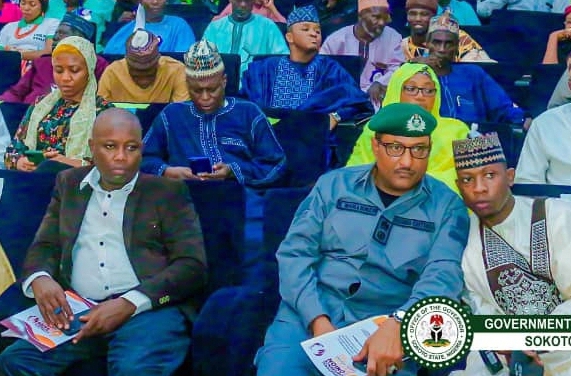By Shalom Oludele and Jameel Gulma
The 6th International Onion Conference, organized by the National Onion Producers, Processors and Marketers Association of Nigeria (NOPPMAN) and the Regional Observatory of Onion Sector in West and Central Africa (ROO/WCA), emphasized the need for enhanced training opportunities for women in the onion industry. The Mabera Women Cooperative revealed plans aimed at addressing storage issues and infrastructure challenges to reduce post-harvest losses and create more opportunities for women within the onion sub-sector.
The two-day event, themed “The Onion Sector in the Era of the Domestication of the African Continental Free Trade Area (AfCFTA) and the Pan African Payment Settlement System (PAPSS): Challenges and Opportunities,” took place from October 15-16, 2024, at the International Conference Centre in Kasarawa, Sokoto State. Delegates from approximately fifteen African nations attended, including state governors, government officials, and stakeholders from various government and private sectors in Nigeria.
Key objectives of the conference included enhancing market access for onion producers and exporters, promoting the AfCFTA and PAPSS, fostering financial inclusion for onion exporters, encouraging sustainable agricultural practices, facilitating public-private partnerships, and tackling post-harvest losses and infrastructure issues.
The significance of public-private partnerships was highlighted as essential for promoting innovation, accessing new markets, and scaling production. Furthermore, the conference underscored the importance of regional collaboration to exchange best practices and enhance the integration of African markets through the AfCFTA framework.
In her keynote address, Mrs. Nonye Ayeni, Executive Director/CEO of the Nigerian Export Promotion Council, emphasized the council’s role in increasing Nigeria’s exportable products and foreign exchange earnings. She noted that the conference theme reflects the commitment of key stakeholders to seize the opportunities presented by the AfCFTA, which offers significant export potential within Africa. “Sokoto State borders key ECOWAS countries, positioning it as a vital market for agricultural commodities like onions,” she stated, highlighting the need to enhance production, add value, and improve product standards to expand the exportable food basket.
Sokoto State Governor, Alh. (Dr.) Ahmad Aliyu Sokoto, FCNA, PhD, expressed gratitude to NOPPMAN for establishing Sokoto State as Nigeria’s leading onion producer. He encouraged the Nigerian Export Promotion Council and NOPPMAN to attract investment for an onion processing factory in the state, assuring support from his administration to bolster the local economy.
NOPPMAN President, Alhaji Aliyu Isah Maitasamu, affirmed the relevance of the conference theme for the future of the onion sector and the broader agricultural value chain in Africa. He acknowledged the necessity for collaboration among stakeholders to achieve the conference’s goals.
As part of the conference, the Raw Materials and Research Development Council (RMRDC) introduced a comprehensive roadmap for onion policy development in Nigeria, presented in a 100-page document prepared by experts across various sectors, including production, processing, and exportation. Professor Nnanyelugo Martin Ike-Muonso, Director General of the council, commended NOPPMAN’s president for his dedication to the onion sub-sector.
Addressing agricultural challenges like climate change, low modernization levels, and financial access, Kebbi State Governor, Comrade Dr. Nasir Idris, represented by Agriculture Commissioner Hon. Shehu Muazu, unveiled the “Kaura Agricultural Development Agenda” (KADAGE). The program has distributed 500 tonnes of fertilizers and 5,000 solar power units to farmers, further strengthening Kebbi State’s position in onion production and fostering knowledge sharing among communities.
During a panel discussion, delegates highlighted significant challenges facing onion exports, citing the sector’s informal nature and currency recognition issues that hinder proper repatriation of export proceeds. They recommended linking export forms with the Pan African Payment Settlement System to facilitate repatriation within Africa, thereby addressing smuggling concerns and easing trade formalization.
The conference also noted inaccuracies in data published by the National Agricultural Extension and Liaison Services (NAERLS) regarding onion production and export. It called for collaboration between NAERLS and NOPPMAN to ensure accurate data collection and reporting.
The conference concluded with a call for government support, particularly from the Central Bank of Nigeria, to educate farmers and traders on utilizing the AfCFTA and PAPSS effectively.
The newly elected executives of ROO/WCA were inaugurated, with Alhaji Aliyu Isah Maitasamu taking over as president. The outgoing president, Alhaji Mustapha Kadiri, expressed gratitude to the Sokoto State government for its hospitality and assured stakeholders that the new president would adeptly manage the onion sector’s affairs.
The conference culminated in the presentation of awards to deserving stakeholders.











